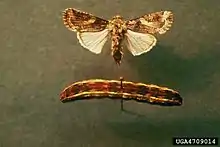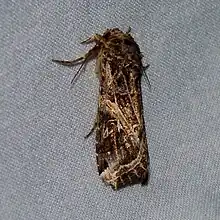Spodoptera ornithogalli
Spodoptera ornithogalli (yellow-striped armyworm, cotton cutworm) is a moth of the family Noctuidae.
| Spodoptera ornithogalli | |
|---|---|
 | |
 | |
| Scientific classification | |
| Domain: | Eukaryota |
| Kingdom: | Animalia |
| Phylum: | Arthropoda |
| Class: | Insecta |
| Order: | Lepidoptera |
| Superfamily: | Noctuoidea |
| Family: | Noctuidae |
| Genus: | Spodoptera |
| Species: | S. ornithogalli |
| Binomial name | |
| Spodoptera ornithogalli Guenée, 1852 | |
| Synonyms | |
| |
When first discovered this particular species was thought to be the American representative of S. littoralis as the two species have very similar forms. However, S. ornithogalli is known to have much darker color body with sharper markings.[1]
Description

The wingspan of the adult moth is 32–44 millimetres (1+1⁄4–1+3⁄4 in). The fore-wing is brown with tan markings and a blurry white stripe coming from the wing tip. The hind-wing is white with a thin brown margin. Larvae are black with thin yellow stripes on their sides.[2]
Adults are on wing from April to November depending on the location.
Distribution
North America
- Canada: Ontario,[3][4] Quebec[3][4]
- Mexico[3][4]
- United States: Alabama,[3][4] Arizona,[3][4] Arkansas,[3][4] California,[3][4] Colorado,[3][4] Connecticut,[3][4] Delaware,[3][4] Florida,[3][4] Georgia,[3][4] Illinois,[3][4] Indiana,[3][4] Iowa,[3][4] Kansas,[3][4] Kentucky,[3][4] Louisiana,[3][4] Maine,[3][4] Maryland,[3][4] Massachusetts,[3][4] Michigan,[3][4] Minnesota,[3][4] Mississippi,[3][4] Missouri,[3][4] Nebraska,[3][4] New Hampshire,[3][4] New Jersey,[3][4] New Mexico,[3][4] New York,[3][4] North Carolina,[3][4] Ohio,[3][4] Oklahoma,[3][4] Pennsylvania,[3][4] Rhode Island,[3][4] South Carolina,[3][4] Tennessee,[3][4] Texas,[3][4] Utah,[3][4] Virginia,[3][4] West Virginia,[3][4] Wisconsin[3][4]
Central America and the Caribbean
South America
- Argentina[3][4]
- Bolivia[3][4]
- Brazil: Acre,[3][4] Bahia,[3][4] Federal District,[3][4] Espírito Santo,[3][4] Mato Grosso,[3][4] Mato Grosso do Sul,[3][4] Pará,[3][4] Paraná,[3][4] Rio Grande do Sul,[3][4] Roraima,[3][4] Tocantins[3][4]
- Colombia[3][4]
- Ecuador[3][4]
- French Guiana[3][4]
- Peru[3][4]
- Suriname[3][4]
- Venezuela[3][4]
Europe
There were repeated port interceptions throughout 2020, especially on consignments of asparagus from the Americas.[3] Nonetheless so far S. ornithogalli remains otherwise absent from Europe.[3][4]
Ecological distribution
For the complete list see EPPO GD's hosts list.[5]
The larvae feed on various crops, including alfalfa, asparagus,[5][3] bean,[5][3] beet,[5][3] cabbage, clover, maize/corn,[5][3] cotton,[5][3] cucumber, hops, grape, grass, jimsonweed, morning glory, onion, pea, peach, peanut, potato,[5][3] sorghum,[5][3] soybean,[5][3] sunflower,[5][3] sweet potato, Swiss chard, tobacco, tomato,[5][3] turnip, wheat,[5][3] watermelon, and wild onion; ornamentals including chrysanthemum[5][3] and roses;[5][3] and weeds including Amaranthus retroflexus,[5][3] Chenopodium album,[5][3] Datura stramonium,[5][3] Erigeron canadensis,[5][3] Plantago lanceolata,[5][3] and Rumex.[5][3]
References
- Butler, Arthur G. (2009-04-24). "XX. Further notes on the synonymy of the genera of Noctuites". Transactions of the Royal Entomological Society of London. Royal Entomological Society of London. 38 (4): 653–691. doi:10.1111/j.1365-2311.1890.tb03033.x. ISSN 0035-8894.
- Will, Kip; Gross, Joyce; Rubinoff, Daniel; Powell, Jerry A. (2020). Field Guide to California Insects. Oakland, California: University of California Press. pp. 386–387. ISBN 9780520288744.
- "Spodoptera ornithogalli". European and Mediterranean Plant Protection Organization. 2020-09-02. Retrieved 2021-02-02.
- "Spodoptera ornithogalli (PRODOR)[World distribution]". European and Mediterranean Plant Protection Organization. 2021-01-14. Retrieved 2021-02-02.
- "Spodoptera ornithogalli (PRODOR)[Host plants]". European and Mediterranean Plant Protection Organization. 1984-07-16. Retrieved 2021-02-02.